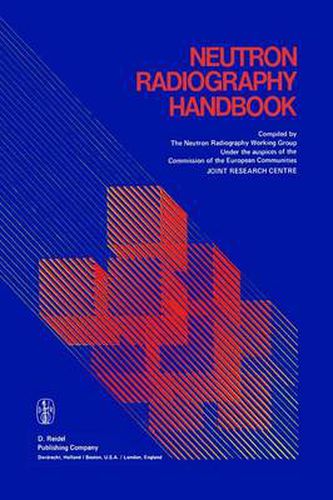Readings Newsletter
Become a Readings Member to make your shopping experience even easier.
Sign in or sign up for free!
You’re not far away from qualifying for FREE standard shipping within Australia
You’ve qualified for FREE standard shipping within Australia
The cart is loading…






This title is printed to order. This book may have been self-published. If so, we cannot guarantee the quality of the content. In the main most books will have gone through the editing process however some may not. We therefore suggest that you be aware of this before ordering this book. If in doubt check either the author or publisher’s details as we are unable to accept any returns unless they are faulty. Please contact us if you have any questions.
Radiography with neutrons can yield important information not obtainable by more traditional methods. In contrast to X-rays as the major tool of visual non-destructive testing, neutrons can be attenuated by light materials like water, hydrocarbons, boron, penetrate through heavy materials like steel, lead, uranium, distinguish between different isotopes of certain elements, supply high quality radiographs of highly radioactive components. These advantages have led to multiple applications of neutron radiography since 1955, both for non-nuclear and nuclear problems of quality assurance. The required neutron beams originate from radioisotopic sources, accelerator targets, or research reactors. Energy tailoring which strongly influences the interaction with certain materials adds to the versatility of the method. Since about 1970 norms and standards have been introduced and reviewed both in Europe (Birmingham, September 1973) and the United States (Gaithersburg, February 1975). The first world conference on neutron radiography will take place in December 1981, in San Diego, U.S.A. . In Europe the interested laboratories inside the European Community have entered into systematic collaboration through the Neutron Radiography Working Group (NRWGl. since May 1979. This Handbook has been compiled as one of the common tasks undertaken by the Group. Its principal authors are J.C. Domanus (Ris0 National Laboratory). and R.S. Matfield (Joint Research Centre, Ispra) Major contributions have been received from R. Liesenborgs (SCK/CEN Mol) R. Barbalat (CEN Saclayl.
$9.00 standard shipping within Australia
FREE standard shipping within Australia for orders over $100.00
Express & International shipping calculated at checkout
This title is printed to order. This book may have been self-published. If so, we cannot guarantee the quality of the content. In the main most books will have gone through the editing process however some may not. We therefore suggest that you be aware of this before ordering this book. If in doubt check either the author or publisher’s details as we are unable to accept any returns unless they are faulty. Please contact us if you have any questions.
Radiography with neutrons can yield important information not obtainable by more traditional methods. In contrast to X-rays as the major tool of visual non-destructive testing, neutrons can be attenuated by light materials like water, hydrocarbons, boron, penetrate through heavy materials like steel, lead, uranium, distinguish between different isotopes of certain elements, supply high quality radiographs of highly radioactive components. These advantages have led to multiple applications of neutron radiography since 1955, both for non-nuclear and nuclear problems of quality assurance. The required neutron beams originate from radioisotopic sources, accelerator targets, or research reactors. Energy tailoring which strongly influences the interaction with certain materials adds to the versatility of the method. Since about 1970 norms and standards have been introduced and reviewed both in Europe (Birmingham, September 1973) and the United States (Gaithersburg, February 1975). The first world conference on neutron radiography will take place in December 1981, in San Diego, U.S.A. . In Europe the interested laboratories inside the European Community have entered into systematic collaboration through the Neutron Radiography Working Group (NRWGl. since May 1979. This Handbook has been compiled as one of the common tasks undertaken by the Group. Its principal authors are J.C. Domanus (Ris0 National Laboratory). and R.S. Matfield (Joint Research Centre, Ispra) Major contributions have been received from R. Liesenborgs (SCK/CEN Mol) R. Barbalat (CEN Saclayl.